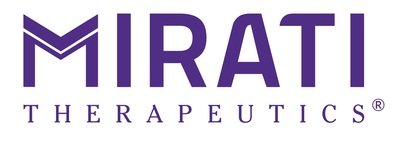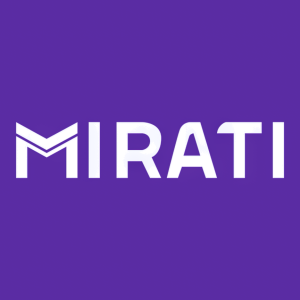European Commission Approves KRAZATI (adagrasib) as a Targeted Treatment Option for Patients with Advanced Non-Small Cell Lung Cancer (NSCLC) with a KRASG12C Mutation
KRAZATI has demonstrated a positive benefit-risk profile based on the Phase 2 registration-enabling cohort of the KRYSTAL-1 study, evaluating KRAZATI 600 mg administered orally twice daily in 116 patients with KRASG12C-mutated advanced NSCLC who previously received treatment with a platinum-based regimen and an immune checkpoint inhibitor. The primary efficacy endpoints were confirmed ORR and DOR as evaluated by blinded independent central review (BICR) according to response evaluation criteria in solid tumors (RECIST v1.1).
"KRAZATI offers an efficacious and tolerable therapeutic option for patients living with advanced KRASG12C -mutated NSCLC and this approval expands the potential treatment options available," Martin Reck, MD, PhD, Lung Clinic Grosshansdorf,
Conditional marketing authorization for KRAZATI is valid in all 27 EU member states plus
"This is a meaningful day for patients living with this difficult-to-treat cancer in the European Union as we can now offer a differentiated and potentially best-in-class therapeutic option to this underserved population," Charles Baum, M.D., PhD, founder, president and chief executive officer, Mirati Therapeutics, Inc., "Mirati is resolute in our commitment to improve upon treatment options for these patients and looks forward to continued partnership with EU members states to create broad access for all qualified patients."
Mirati thanks the patients, physicians, investigators and site coordinators who participated in the clinical trials that led to this important approval.
Important Safety Information
The Summary of Product Characteristics (SmPC) for KRAZATI (adagrasib) will be available from the European Medicines Agency at the Union Register of medicinal products.
About KRAZATI (adagrasib)
Mirati has risen to meet one of the most challenging mutations in cancer research by developing KRAZATI, a highly selective and potent oral small-molecule inhibitor of KRASG12C.
Intentionally designed to meet the challenge of KRASG12C, adagrasib is optimized to sustain target inhibition, an attribute that could be important to treat KRASG12C-mutated cancers, as the KRASG12C protein regenerates every 24−48 hours.1 Adagrasib has shown clinically to be a CNS penetrant, which may be important given that CNS metastases frequently occur in NSCLC and lead to poor prognosis.2-34
The FDA provided KRAZATI Accelerated Approval (Subpart H), allowing for the approval of drugs that treat serious conditions, and that fill an unmet medical need based on surrogate endpoints.
Adagrasib continues to be evaluated as monotherapy and in combination with other anti-cancer therapies in patients with advanced KRASG12C-mutated solid tumors, including NSCLC, colorectal cancer, and pancreatic cancer. For more information, visit Mirati.com/science.
About the KRYSTAL-1 Study
KRYSTAL-1 is an open-label Phase 1/2 multiple-expansion cohort trial evaluating adagrasib as monotherapy and in combination with other anti-cancer therapies in patients with advanced solid tumors harboring the KRASG12C mutation.
About KRASG12C in NSCLC
Lung cancer is one of the most common cancers worldwide, accounting for 2.21 million new cases and 1.8 million deaths worldwide in 2020.5 Lung cancer consists of NSCLC in approximately
About Mirati Therapeutics, Inc.
Mirati Therapeutics, Inc. is a commercial stage biotechnology company whose mission is to discover, design and deliver breakthrough therapies to transform the lives of patients with cancer and their loved ones. The company is relentlessly focused on bringing forward therapies that address areas of high unmet need, including lung cancer, and advancing a pipeline of novel therapeutics targeting the genetic and immunological drivers of cancer. Unified for patients, Mirati's vision is to unlock the science behind the promise of a life beyond cancer.
For more information about Mirati, visit us at Mirati.com or follow us on Twitter, LinkedIn and Facebook.
Forward Looking Statements
This press release includes forward-looking statements regarding Mirati's business, financial guidance and the therapeutic and commercial potential of KRAZATI® (adagrasib), MRTX1719 (MTA-cooperative PRMT5 inhibitor), MRTX0902 (SOS1 inhibitor), and MRTX1133 (selective KRASG12D inhibitor), Mirati's technologies and Mirati's other products in development. Any statement describing Mirati's goals, expectations, intentions or beliefs, financial or other projections, is a forward-looking statement and should be considered an at-risk statement. Such statements are subject to certain risks and uncertainties, including those related to the impact COVID-19 could have on our business, and including those inherent in the process of discovering, developing and commercializing medicines that are safe and effective for use as human therapeutics, and in the endeavor of building a business around such medicines.
Mirati's forward-looking statements also involve assumptions that, if they never materialize or prove correct, could cause its results to differ materially from those expressed or implied by such forward-looking statements. Although Mirati's forward-looking statements reflect the good faith judgment of its management, these statements are based only on facts and factors currently known by Mirati. As a result, you are cautioned not to rely on these forward-looking statements. These and other risks concerning Mirati's programs are described in additional detail in Mirati's annual report on Form 10-K, and most recent Form 10-Q, which are on file with the Securities and Exchange Commission and available at the SEC's Internet site (www.sec.gov). These forward-looking statements are made as of the date of this press release, and Mirati assumes no obligation to update the forward-looking statements, or to update the reasons why actual results could differ from those projected in the forward-looking statements, except as required by law.
Mirati Contacts
Investor Relations: ir@mirati.com
Media Relations: media@mirati.com
References
1 Hallin J, Engstrom LD, Hargis L, et al. The KRASG12C Inhibitor MRTX849 Provides Insight toward Therapeutic Susceptibility of KRAS-Mutant Cancers in Mouse Models and Patients. Cancer Discov. 2020;10(1):54-71.
2 Sabari JK, Velcheti V, Shimizu K, et al. Activity of Adagrasib (MRTX849) in Brain Metastases: Preclinical Models and Clinical Data from Patients with KRASG12C-Mutant Non-Small Cell Lung Cancer. Clin Cancer Res. 2022;28(15):3318-3328.
3 Cagney DN, Martin AM, Catalano PJ, et al. Incidence and prognosis of patients with brain metastases at diagnosis of systemic malignancy: a population-based study. Neuro Oncol. 2017;19(11):1511-1521.
4 Ali A, Goffin JR, Arnold A, Ellis PM. Survival of patients with non-small-cell lung cancer after a diagnosis of brain metastases. Curr Oncol. 2013;20(4):e300-6.
5 Lung cancer statistics. WCRF International. https://www.wcrf.org/cancer-trends/lung-cancer-statistics/. Published April 14, 2022.
6 Molina JR, Yang P, Cassivi SD, Schild SE, Adjei AA. Non-small cell lung cancer: epidemiology, risk factors, treatment, and survivorship. Mayo Clin Proc. 2008;83(5):584-94.
![]() View original content to download multimedia:https://www.prnewswire.com/news-releases/european-commission-approves-krazati-adagrasib-as-a-targeted-treatment-option-for-patients-with-advanced-non-small-cell-lung-cancer-nsclc-with-a-krasg12c-mutation-302030681.html
View original content to download multimedia:https://www.prnewswire.com/news-releases/european-commission-approves-krazati-adagrasib-as-a-targeted-treatment-option-for-patients-with-advanced-non-small-cell-lung-cancer-nsclc-with-a-krasg12c-mutation-302030681.html
SOURCE Mirati Therapeutics, Inc.








